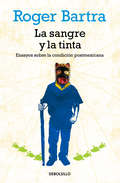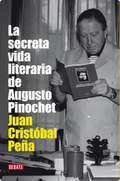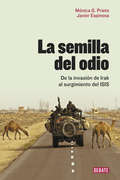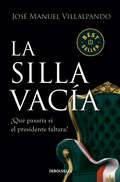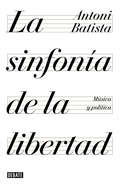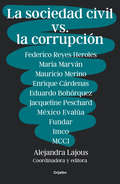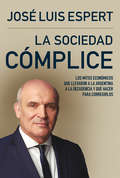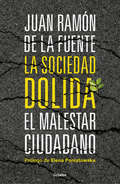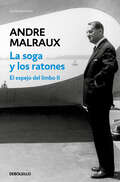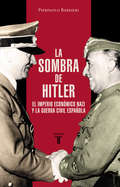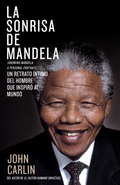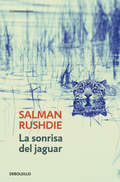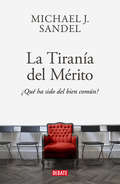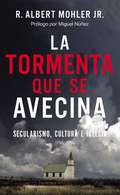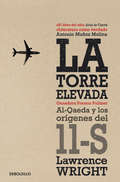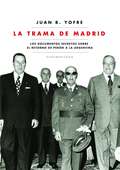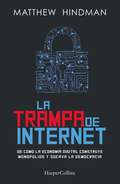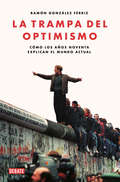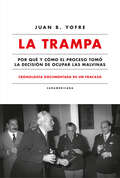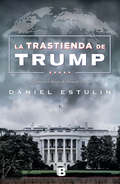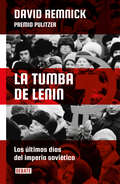- Table View
- List View
La saga de los Windsor: La pompa y el esplendor de una de las familias reales más emblemáticas de todos
by Cars, Jean desLa verdadera historia de una familia extraordinaria, con sus tragedias y sus dramas personales. La pompa y el esplendor de una de las familias reales más emblemáticas de todos los tiempos. El 11 de diciembre de 1936 el rey Eduardo VIII abdica por el amor de Wallis Simpson, dos veces divorciada. Con su renuncia el hijo mayor del rey Jorge V se convierte en el duque de Windsor. Y es su hermano, que logra sobreponerse con valentía a su tartamudez (El discurso del rey), quien le sucede con el nombre de Jorge VI. De la Inglaterra todavía impregnada por el prestigio de la reina Victoria al largo reinado de Isabel II, de los caballeros con bombín a los Beatles, de la inmensa figura de Churchill al trágico destino de la princesa Diana y después a la boda de Guillermo y Catalina, que sedujo a millones de espectadores, he aquí la extraordinaria saga de un linaje de monarcas, de reinas, de príncipes y de princesas con destinos dignos de las mejores novelas. El historiador francés Jean des Cars, biógrafo de las grandes dinastías de Europa y de sus más ilustres representantes, construye en La saga de los Windsor la trayectoria sentimental de una de las familias reales más influyentes del viejo continente con un estilo documentado y riguroso. La historia personal de cada uno de sus miembros y de cómo en muchas ocasiones tuvieron que renunciar a los dictados de su corazón en favor de la corona. Traición, celos, matrimonios de conveniencia, espionaje, estado, poder, amor, escándalo, ¿qué significa pertenecer a la saga de los Windsor? Reseña:«Gracias a la pluma de Jean des Cars la historia trepidante de la monarquía inglesa, íntimamente ligada a la del siglo XX, se lee como una novela». Blaise de Chabalier, Le Figaro
La sangre y la tinta
by Roger Bartra"La idea de que la identidad nacional mexicana se encuentra en crisis y que estamos entrando en una condición postmexicana sigue siendo pertinente hoy en día; y acaso más que en 1999, cuando se publicó la primera edición de La sangre y la tinta, debido al retorno del PRI al poder en 2012. La llegada de un presidente priísta, en un contexto postmexicano, es un espectáculo fascinante e intrigante. Espero que este libro sirva como una guía que ayude a entender los nuevos avatares de la política mexicana."ROGER BARTRA"Roger Bartra es uno de los pocos intelectuales mexicanos que ha logrado dialogar consigo mismo, desdoblándose en autor y crítico, escritor y lector, sujeto y objeto de su permeable meditación antropológica."RAFAEL ROJAS, Letras Libres
La secreta vida literaria de Augusto Pinochet
by Juan Cristóbal PeñaLa desconocida y oscura vida literaria de Augusto Pinochet "Cada pieza de esta ingente investigación periodística va dando forma al perfil intelectual de quien dirigió Chile durante diecisie¬te años. Lo que aflora es un personaje receloso y obsesivo, con un gran complejo de inferioridad que lo atormentaba. De ahí, como plantea el autor, que el asesinato del general Carlos Prats, el mejor alumno de su generación, haya estado motivado por el resentimiento de un militar enceguecido por el poder.Así se entiende también que mucho antes de protagonizar el golpe de Estado de 1973 Augusto Pinochet haya desarrollado una empeñosa carrera como académico y autor de libros de his¬toria y geografía relevantes para generaciones de militares en Chile. Ese afán por sobresalir lo llevó a escribir un libro como Geopolítica, en el que reprodujo párrafos copiados al pie de la letra de un texto de Gregorio Rodríguez, su profesor en la Academia de Guerra. Desde el joven aprendiz que logró entrar a la Escuela Militar solo después de dos intentos fracasados hasta el coleccionista que creó bibliotecas avaluadas en millones de dólares, surge aquí un hombre a la luz de sus debilidades y al amparo también de una corte de escritores y editores, bibliotecarios y libreros que se empeñaron en forjar su imagen. Con la rigurosidad y el talento narrativo a los que nos tiene acostumbrados, Juan Cristóbal Peña -autor del premiado reportaje «Viaje al fondo de la biblioteca de Pinochet», antecedente de este libro-, logra aquí el retrato íntimo de un dictador.
La semilla del odio
by Javier Espinosa Mónica G. Prieto¿En qué momento se desató el caos e imperó el horror en Oriente Próximo? En La semilla del odio los reporteros Mónica G. Prieto y Javier Espinosa revisan la historia reciente de la región más convulsa del mundo para esclarecer las causas que originaron el conflicto. La invasión ilegal de Bagdad en 2003 y el desgobierno posterior levantó a la población de Irak en armas, pero también resucitó el odio sectario que había permanecido enterrado durante la dictadura de Sadam Hussein. El ascenso al poder de la mayoría chií, reprimida por la minoría suní durante décadas, y la impunidad de los ocupantes alimentó la aparición de una insurgencia nacionalista que en su lucha contra las fuerzas extranjeras se alió con los yihadistas, más proclives a sembrar el terror con atentados suicidas y secuestros que a combatir los soldados de la alianza liderada por EEUU, en la que participó España. El auge de los radicales liderados por el jordano Abu Musab al Zarqaui terminó así por imponer un califato del terror en amplias regiones del país, exportando su agenda a todo Oriente Próximo. En La Semilla del Odio, Mónica G. Prieto y Javier Espinosa realizan un exhaustivo repaso a una década de vivencias en una de las zonas más convulsa del mundo y reconstruyen, mediante palpitantes y estremecedores reportajes, los pasos que llevaron a una región a quedar secuestrada por el Estado Islámico de Irak, origen del ISIS.
La semilla del odio: De la invasión de Irak al surgimiento del ISIS
by Javier Espinosa Mónica G. Prieto¿En qué momento se desató el caos e imperó el horror en Oriente Próximo? En La semilla del odio los reporteros Mónica G. Prieto y Javier Espinosa revisan la historia reciente de la región más convulsa del mundo para esclarecer las causas que originaron el conflicto. La invasión ilegal de Bagdad en 2003 y el desgobierno posterior levantó a la población de Irak en armas, pero también resucitó el odio sectario que había permanecido enterrado durante la dictadura de Sadam Hussein. El ascenso al poder de la mayoría chií, reprimida por la minoría suní durante décadas, y la impunidad de los ocupantes alimentó la aparición de una insurgencia nacionalista que en su lucha contra las fuerzas extranjeras se alió con los yihadistas, más proclives a sembrar el terror con atentados suicidas y secuestros que a combatir los soldados de la alianza liderada por EEUU, en la que participó España. El auge de los radicales liderados por el jordano Abu Musab al Zarqaui terminó así por imponer un califato del terror en amplias regiones del país, exportando su agenda a todo Oriente Próximo. En La Semilla del Odio, Mónica G. Prieto y Javier Espinosa realizan un exhaustivo repaso a una década de vivencias en una de las zonas más convulsa del mundo y reconstruyen, mediante palpitantes y estremecedores reportajes, los pasos que llevaron a una región a quedar secuestrada por el Estado Islámico de Irak, origen del ISIS.
La silla vacía
by José Manuel Villalpando¿Qué pasaría si el presidente faltara? En enero de 2021, el presidente de México, Andrés Manuel López Obrador, tuvo que ausentarse durante dos semanas de sus labores oficiales para recibir tratamiento debido a una infección causada por covid-19. Aunque se recuperó satisfactoriamente, las dudas y especulaciones no tardaron en aparecer: ¿qué pasaría si el presidente quedara incapacitado por la enfermedad, confinado a una cama de hospital y a un respirador, o si hubiera sido una más de los cientos de miles de víctimas mortales de este virus? Estas y otras preguntas apuntan a un tema por largo tiempo soslayado en la labor legislativa de nuestro país: la suplencia presidencial. En este libro, José Manuel Villalpando aborda el problema de manera minuciosa, nutriéndose tanto del derecho como de la historia para adentrarnos en los vericuetos legales que operarían en el caso de que la presidencia de nuestropaís quedara vacante por cualquier razón. En el proceso, resalta los difíciles momentos políticos que el país vivió cuando fue necesario afrentar la sucesión presidencial: Santa Anna, Juárez, Porfirio Díaz, Madero y el Maximato de Plutarco Elías Calles, entre otros casos sonados, y documenta las fallas y omisiones de un proceso constitucional que no ha recibido toda la importancia que merece.
La sinfonía de la libertad: Música y política
by Antoni Batista<P>Esta obra ofrece una gran panorámica de la música política de todos los tiempos, compositores e intérpretes. Si eres amante de la música, disfrutarás con esta faceta de Antoni Batista en un viaje inédito por el arte de los sonidos. <P>Mozart hizo política. Beethoven es el legado de la Revolución Francesa a la Unión Europea. Chopin, Verdi, Sibelius, Falla reivindicaron patrias libres. Dvorak inventó el federalismo sinfónico. La inmensa creatividad de Shostakóvich venció al estalinismo. Casals desafió a Franco y a Hitler. Celibidache se rebeló contra la industria discográfica. Barenboim unió a palestinos y a judíos... <P>La música y la política se han ido entrelazando a lo largo de la historia, pero es una relación poco menos que desconocida. La sinfonía de la libertad recoge sus encuentros más significativos. Además de abundante información, que sorprenderá a muchos, este libro contiene aportaciones musicológicas originales de un autor que logra aunar el desafío intelectual del ensayo con el ritmo trepidante de la narrativa.
La sociedad civil vs. la corrupción
by Alejandra LajousFederico Reyes Heroles María Marván Mauricio Merino Enrique Cárdenas Eduardo Bohórquez Jacqueline Peschard México Evalúa Fundar Imco MCCI Coordinadora y editora: Alejandra Lajous Algunos de los mayores logros en el méxico moderno se deben a la sociedad civil organizada. Buena parte de los avances por la transparencia, la rendición de cuentas, la participación política y contra la corrupción ha ocurrido gracias a asociaciones y activistas combativos y persistentes. Hoy, ante la embestida que sufren las organizaciones no gubernamentales, es obligatorio recordar y defender su trabajo. Enumerar sus logros y el papel que cumplen. Oír sus voces. Y entender que, en ellas, México tiene un verdadero contrapeso independiente a los excesos del poder. En esta obra toman la palabra algunos de los referentes en la sociedad civil. Relatan sus historias, explican sus motivaciones y argumentan en favor de la participación plural, articulada y rigurosa. Desde la polifonía y la diversidad, surge así una voz común que nos recuerda que México es tan grande como su ciudadanía, y que la calidad de su democracia depende de la participación crítica de sus habitantes.
La sociedad cómplice: Los mitos económicos que llevaron a la Argentina a la decadencia y qué hacer para corregirlos
by José Luis EspertLa sociedad cómplice es un ensayo sin anestesia, que analiza la verdadera Argentina, aquella que se esconde detrás de las ideas falsas que nos sirven de excusa para no avanzar y no reconocer los problemas reales. José Luis Espert se hace cargo y las refuta, mostrando qué pasó realmente y qué deberíamos hacer para que la economía funcione definitivamente. Vivir en la Argentina no es fácil. Trabajás más de la mitad del año para pagar impuestos. Te obligan a comprar carísimo. Tu salario es una miseria y se evapora con la inflación. Te ofrecen servicios públicos del Tercer Mundo. No caminás tranquilo por la calle porque pueden robarte el celular, que igual te sirve de poco porque la señal es pobre. Dormís mal, preocupado por tus hijos. Te cortan la calle cuando vas a trabajar. Los sindicalistas que dicen defenderte viven como magnates y los políticos que dicen cuidarte amasan fortunas. Los empresarios que dicen darte trabajo producen bienes malos que te cobran a precio de oro. Nuestra moneda perdió trece ceros en 22 años. Pensémoslo así: la superficie de la Argentina es de 2.780.400 kilómetros cuadrados. Si estuviera cubierta con baldosas de 52 centímetros, después de perder esos trece ceros nos quedaríamos con una sola baldosa. La culpa es nuestra porque compramos mitos: el déficit fiscal, el peronismo, la hiperinflación, el Rodrigazo, la crisis de 2001, las jubilaciones, entre otros. «La sociedad cómplice hace un recorrido bien completo de las creencias y demandas de una historia económica tan tediosamente repetida que va siendo hora de que alguna generación sospeche que hay algo muy malo en cómo se explica al mundo y al propio país. Esta obra podría titularse 'Todos sabemos lo que hay que hacer', porque su foco lo hace obvio».José Benegas, analista político
La sociedad dolida: El malestar ciudadano
by Juan Ramón de la Fuente¿Qué le duele a México y al mundo? ¿Cuáles son los padecimientos sociales que urge sanar? La guerra antinarco, la inconformidad social, la furia, las plagas de la obesidad y la diabetes, las políticas de Trump, el calentamiento global, las heridas que dejó el terremoto, el populismo... En esta obra y mediante artículos contundentes y rigurosos, el doctor Juan Ramón de la Fuente, exrector de la UNAM y exsecretario de Salud de México, realiza un vasto diagnóstico de los padecimientos que afrontan el país y el planeta. Desde su doble perspectiva de médico experto y profundo conocedor de la realidad sociopolítica, el autor no sólo hace una radiografía de los trastornos y las afecciones que nos agobian, sino que explica los riesgos que conllevan, sus consecuencias, e incluso esboza vías de solución. De cara a 2018, los treinta y ocho análisis deJuan Ramón de la Fuente cobran una importancia señera para dilucidar qué nación hemos construido y hacia dónde queremos encaminarla. Prólogo de Elena Poniatowska "A este libro lo veo como un colibrí en el paisaje gris y triste de nuestro país, al que Juan Ramón -intelectual abierto y generoso- transforma en una pincelada azul" Elena Poniatowska, del prólogo.
La soga y los ratones (El espejo del limbo #Volumen 2)
by André MalrauxSegundo volumen de memorias de André Malraux, incomparable testimonio uno de los grandes intelectuales franceses del siglo xx. En La soga y los ratones, segundo batiente de las memorias tituladas El espejo del limbo, André Malraux presenta un agudo testimonio de su tiempo a través de su increíble biografía, con particular atención a sus años de madurez. Dividido en seis partes diferenciadas, el libro repasa sus encuentros con las principales figuras contemporáneas en las esferas política y artística. Y al igual que su predecesor, Antimemorias, acaba conformando un relato originalísimo y deslumbrante, que propone una reflexión de gran calado sobre el devenir de la historia, las grandes transformaciones del siglo XX, el mal, la fraternidad, la muerte y lo único que le ofrece resistencia: la capacidad de los humanos de metamorfosearse a través del arte. Nuestra edición se completa una abarcadora introducción sobre la génesesis de la obra y una cronología de la vida del autor, ambas a cargo de Ignacio Echevarría. Sobre el autor:«Malraux se presenta como el héroe que ha sabido no morir, gracias a la última audacia de su obra».Carlos Ortega
La sombra de Hitler: El imperio económico nazi y la Guerra Civil española
by Pierpaolo BarbieriUna nueva y solvente teoría sobre la relación entre nazismo y franquismo. La Guerra Civil española a menudo se ha considerado como un ensayo general velado de la Segunda Guerra Mundial. El bando nacional se impuso gracias a la asistencia militar alemana e italiana, una colaboración hasta ahora entendida como natural entre regímenes afines que unen fuerzas en la lucha contra el bolchevismo. Frente a esa versión aceptada, Pierpaolo Barbieri defiende que fueron ambiciones económicas -y no razones ideológicas- las que impulsaron la intervención de Hitler. Barbieri demuestra que al apoyo material -aviones, armamento y tanques- subyacía un imperio informal que los nazis ejercieron mediante el control de recursos clave españoles, empleados para alimentar la floreciente industria bélica alemana. Este plan sólo fue posible gracias a Hjalmar Schacht, un «mago de las finanzas internacionales» cuyas políticas propiciaron el crecimientodel Tercer Reich, y alcanzaron su culmen en la relación económica sumamente ventajosa para Alemania que estableció el régimen nazi con el bando franquista. Sólo más adelante, ese imperio informal dio paso a un imperio racial en el que la rentabilidad económica quedó supeditada a criterios de carácter ideológico. Basado en una profunda investigación por distintos países de Europa, en seis idiomas y mediante documentos de archivos tanto republicanos como nacionales, La sombra de Hitler arroja nueva luz sobre una tragedia fratricida cuyos ecos aún resuenan en la sociedad española. La crítica ha dicho:«El imperio de la sombra de Hitler cuestiona la idea que teníamos de las intervenciones de Alemania e Italia en la Guerra Civil española. En este brillante debut, Pierpaolo Barbieri muestra que el imperialismo informal desempeña un papel más importante que la ideología fascista en el modo en que Berlín miró al conflicto. Barbieri también tiene buen oído para captar los ecos de la Guerra Civil que resuenan hoy en España -y de hecho también en Europa-.»Niall Ferguson «Un relato fascinante y estupendamente escrito del plan de dominación económica que Alemania lanzó en los años treinta. Barbieri nos lleva a replantearnos la relación entre economía y políticas raciales en la elaboración de la ofensiva nazi.»Harol James (Princeton) «Nada refleja los giros y cambios en la política económica y militar alemana antes de 1939 con tanta claridad como la participación alemana en la Guerra Civil española. Pierpaolo Barbieri ofrece un relato claro y convincente de cómo el «imperio informal» en España se convirtió en un trampolín para el imperialismo real en el resto de Europa.»Richard Overy
La sombra del dictador: Una memoria política de la vida bajo el régimen de Augusto Pinochet
by Heraldo MuñozUn notable retrato, a mitad de camino entre el ensayo y la autobiografía, sobre el Chile de Pinochet. Publicado originalmente en inglés en 2009, este libro que retrata la vida de un militante socialista que el 11 de septiembre se encontraba en la calle con un revolver y dinamita, ofrece nuevas luces sobre la vida política y cotidiana de Chile a partir de 1973 poniendo énfasis, sobre todo, en los múltiples alcances de la figura del dictador: su propio golpe dentro de la junta militar, su rol en el desarrollo económico impulsado por los Chicago Boys, la represión, el intento de asesinato en 1986, la derrota electoral de 1988, su detención en Londres y finalmente su caída en desgracia luego del caso Riggs. Pero sobre todo, el enfoque de esta indagación es el rol de los Estados Unidos como parte activa de esta historia.
La sonrisa de Mandela
by John Carlin"Creo que, pese a la gran presencia de Mandela en la escena internacional, aún queda mucho por decir sobre el hombre, la calidad de su liderazgo y el legado que deja al mundo. Mi esperanza es que los lectores de este libro se lleven una idea más profunda de Mandela como persona y de porqué ha sido la figura moral y política más importante de nuestra época". --John Carlin Entre el 11 de febrero de 1990 y el 10 de mayo de 1994, Nelson Mandela pasó de ser el prisionero político más famoso del mundo a presidente de su país. Fueron cuatro años acelerados y fascinantes que dieron la talla humana y política de un líder excepcional. John Carlin, observador privilegiado de esa etapa, traza un emocionante retrato de Mandela en el que demuestra que se puede ser un gran líder político sin dejar de ser una gran persona, y que la reconciliación y la convivencia son no sólo deseables sino posibles incluso en las circunstancias más difíciles.
La sonrisa del jaguar
by Salman RushdieRushdie viajó a Nicaragua en 1986, en plena revolución sandinista, sin ideas preconcebidas de lo que se iba a encontrar. Lo que descubrió le impresionó sobremanera: una cultura de héroes convertidos en objetos inanimados, y de políticos y guerrilleros que eran poetas; una tierra difícil, llena de hermosas contradicciones. Con su mirada, sobre la que seimpre pesa su especial sensibilidad, Rushdie nos descubre una tierra en la que resuena continuamente el estruendo del choque entre historia y moral, entre el gobierno y los individuos. Un preciso y obsesivo retrato de la gente, la política, la tierra y la literatura de un país sumergido en la revolución.
La tiranía del mérito: ¿Qué ha sido del bien común?
by Michael J. SandelEl profesor de filosofía más famoso del mundo, analiza el fracaso del sistema meritocrático y aborda la pregunta más importante de nuestra época: ¿qué ha sido del bien común? Las sociedades occidentales padecen dos males relacionados, la desigualdad económica y la polarización política. En el marasmo resultante, parece que hemos perdido de vista la noción clave del bien común. En esta obra fundamental, Michael J. Sandel se plantea cómo recuperarla. Cuando solo hay ganadores y perdedores y la movilidad social se ha atascado, resulta inevitable la combinación de ira y frustración que alimenta la polarización y la protesta populista, además de reducir la confianza en las instituciones y en nuestros conciudadanos. Así no podemos hacer frente moralmente a los retos actuales. Sandel, premio princesa de Asturias de Ciencias Sociales y uno de los filósofos más prestigiosos de nuestra época, sostiene que para superar las crisis que asedian nuestras sociedades hemos de repensar las ideas de éxito y fracaso que han acompañado la globalización y el aumento de la desigualdad. La meritocracia genera una complacencia nociva entre los ganadores e impone una sentencia muy dura sobre los perdedores. Sandel defiende otra manera de pensar el éxito, más atenta al papel de la suerte, más acorde con una ética de la humildad y la solidaridad y más reivindicativa de la dignidad del trabajo. Con esos mimbres morales, La tiranía del mérito presenta una visión esperanzadora de una nueva política centrada por fin en el bien común.
La tormenta que se avecina: Secularismo, cultura e Iglesia
by R. Albert Mohler, Jr.El presidente del Seminario del Sur revela cómo el secularismo se ha infiltrado en todos los aspectos de la sociedad y cómo los cristianos, equipados con el evangelio de Jesucristo, pueden enfrentarlo directamente con esperanza, confianza y convicción firme.Se avecina una tormenta. La civilización occidental y la iglesia cristiana se encuentran en un momento de gran peligro. La tormenta es una batalla de ideas que determinará el futuro de la civilización occidental y el alma de la iglesia cristiana. Las fuerzas que debemos combatir son ideologías, políticas y visiones del mundo que están profundamente enraizadas entre las élites intelectuales, la clase política y nuestras escuelas. Más amenazante, estas ideas también han invadido la iglesia cristiana.Desde amenazas a la libertad religiosa y redefiniciones del matrimonio y la familia hasta ataques a lo sagrado y la dignidad de la vida humana, los peligros que enfrentan el Occidente y la iglesia no tienen precedentes. ¿Cómo deben responder los cristianos a este desafío? La tormenta que se avecina proporciona la respuesta, abordando cada dimensión de la cultura y mostrando a los cristianos cómo dar una respuesta a la esperanza que hay dentro de ellos y cómo luchar por la fe que fue entregada de una vez por todas a los santos.The Gathering StormThe president of Southern Seminary reveals how secularism has infiltrated every aspect of society and how Christians, equipped with the gospel of Jesus Christ, can meet it head on with hope, confidence, and steadfast conviction.A storm is coming. Western civilization and the Christian church stand at a moment of great danger. The storm is a battle of ideas that will determine the future of Western civilization and the soul of the Christian church. The forces we must fight are ideologies, policies, and worldviews that are deeply established among intellectual elites, the political class, and our schools. More menacingly, these ideas have also invaded the Christian church.From threats to religious liberty and redefinitions of marriage and family to attacks on the sacredness and dignity of human life, the perils faced by the West and the church are unprecedented. How should Christians respond to this challenge? The Gathering Storm provides the answer, addressing each dimension of culture and showing Christians how to give an answer for the hope that is within them and how to contend for the faith that was once and for all delivered to the saints.
La torre elevada: Al-Qaeda y los orígenes del 11-S
by Lawrence WrightLa torre elevada narra la increíble historia de varios hombres cuyos destinos se entrecruzan y confluyen de forma dramática el 11 de septiembre de 2001. Con una precisión poco común, sustentada en más de quinientas entrevistas realizadas a lo largo de cinco años, nos describe el auge del fundamentalismo islámico, la creación de al-Qaeda y los errores cometidos por los confiados servicios de inteligencia que culminaron en el atentado de las Torres Gemelas. Lawrence Wright recrea de modo excepcional la transformación de Osama bin Laden y Ayman al-Zawahiri de combatientes idealistas e incompetentes en Afganistán a líderes del grupo terrorista más importante de la historia; y sigue de cerca a John O'Neill, jefe de la sección de contraterrorismo del FBI y uno de los pocos agentes estadounidenses que comprendió, ya en los años noventa, la magnitud de la amenaza que representaba dicha organización. Lleno de información, con una profunda perspectiva histórica, este es el mejor libro escrito sobre los orígenes de al-Qaeda y el atentado que cambió el curso de la historia. Esta edición incluye un epílogo del autor con motivo del décimo aniversario de los atentados del 11-S, la evolución de al-Qaeda y la muerte de Bin Laden. «El libro del año. » JOHN LE CARRÉ «Literatura como verdad. » ANTONIO MUÑOZ MOLINA «Ganó el Premio Pulitzer. Su fuerza tremenda reside en el relato de los hechos y de sus orígenes, de los procesos mediante los cuales hombres corrientes eligen matar y morir en nombre de delirios arcaicos; y de cómo las ideas más dementes llegan a convertirse paso a paso en actos que cambian el curso del mundo y que podían haberse evitado. » ANTONIO MUÑOZ MOLINA «La torre elevada es el mejor libro que se ha escrito sobre Bin Laden, su relación con al-Zawahiri y el 11-S. » El País
La tragedia griega. La crisis financiera de Europa explicada de forma sencilla
by Angelos IoannisAl comienzo de la crisis griega, Manos, un exitoso hombre de negocios de mediana edad, pierde su empleo. Sin oportunidades de trabajo y seriamente endeudado, se retira a un pequeño pueblo costero cerca de Atenas a vivir en la que solía ser la casa de verano de su familia. Sentado en su balcón una mañana, mira al espléndido cielo azul y a las aguas cristalinas. Se pregunta por qué se siente desesperado en un entorno tan bello. Por qué su país, lleno de recursos y de gente preparada, está también desesperado. ¿Qué fue lo que hizo que Grecia se pusiera de rodillas? No le satisfacen las respuestas que recibe de los medios de comunicación. Al salir de su casa se encuentra con varias personas, entre las que se encuentran un panadero, un cura y un banquero británico jubilado, todos ellos con su propia versión. Basado en una historia real, este libro relata un día en la vida de Manos para tratar de arrojar luz sobre la vida en la Grecia de la crisis y para aclarar las verdaderas razones de la deuda griega. De manera simple, explica la estructura del sistema financiero actual y la integración europea. Finalmente, desvela lo que realmente causó la crisis, primero en Grecia y más tarde en Europa. ¿Puede sobrevivir Grecia a la crisis? ¿Hay una solución para Europa?
La trama de Madrid: Los documentos secretos sobre el retorno de Perón a la Argentina
by Juan B. YofrePolémica revelación de documentos secretos pertenecientes al últimoperíodo de exilio de Perón en Puerta de Hierro y que demuestran cómopergeñó su retorno a la Argentina para volver a ser Presidente. "No necesito el bastón para tener poder", dijo Juan Domingo Perón pocoantes de retornar a la Argentina, en 1973, cuando Héctor J. Cámpora,angustiado, intentó darle su banda presidencial. Era de noche, yFrancisco Franco ofrecía una cena de gala en el Palacio de Orientemadrileño. Cámpora, con todos sus distintivos honoríficos, quisoconvencer al ex presidente de que su presencia era más que oportuna.Perón se negó con arrogancia. Estaba irritado. "No me queda otrasolución que volver allá y poner las cosas en orden", confesaba en laintimidad.Este episodio es el paradigma de todas las acciones que, desde suexilio, llevó a cabo Perón para reconquistar el poder. Un país por largotiempo en llamas, dividido en dos ejes: Buenos Aires y Puerta de Hierro.Como uno de los mejores estrategas y políticos que ha tenido laArgentina, Perón siempre supo que el poder no puede quedar sin dueño. Yque debe ser resguardado en un único sitio. Por eso, desde Madrid,comienza a urdir una trama.La trama de Madrid. Los documentos secretos sobre el retorno de Perón ala Argentina cuenta la historia de cómo llega a la presidencia de laNación para reconciliar a los argentinos. Comenzando desde su vínculocon Jorge Daniel Paladino #el hombre que lo ayudó a instalarsedefinitivamente entre y sobre todos los políticos vernáculos# hasta el"golpe blanco" contra Cámpora, Juan B. Yofre plasma, como en un coropolifónico, todas las desinteligencias e intrigas que caracterizaroneste período: la muerte de Vandor, el asesinato de Aramburu, lainstitución de la "Cámara del terror", la fuga del penal de Rawson, laconducta del presidente chileno Salvador Allende, los diálogos conBalbín, los dobles agentes, la entrega a Perón de los restos de Evita.A los documentos inéditos, testimonios y archivos personales que nuncaantes fueron develados, hay que añadir el rigor de las deducciones querealiza el autor, que nuevamente apuesta a comprender la complejidad delpasado para repensar los problemas de nuestro presente.
La trampa de internet: Cómo la economía digital construye monopolios y destruye la democracia
by Matthew HindmanNos dijeron que Internet fragmentaría las audiencias y hacía que los monopolios de los medios fueran imposibles. En cambio, gigantes como Google y Facebook ahora dominan casi todo el tiempo que pasamos en línea y obtienen todos los beneficios de la economía de la atención. La trampa de la Internet explica cómo sucedió esto. Este libro provocativo y oportuno arroja luz sobre el sorprendente aumento de los gigantes digitales y las luchas en línea de casi todos los demás.Este libro revela el gran impacto de las fuentes de noticias en línea para la democracia y la economía de mercado. Utiliza datos nuevos y actualizados sobre el tráfico de la página web y la vida útil del sitio web. El argumento del libro atraerá a audiencias fuera del mundo académico, con aplicaciones prácticas sobre cómo puede la gente Entender el mundo de las noticias online.La información expuesta en el libro está debidamente sustentada con fuentes de información confiables. Está avalado por un gran trabajo de investigación y capacidad de análisis de datos, el texto se atiene principalmente a un análisis cuantitativo; sin embargo, cuando es preciso explicar fenómenos sociales, el autor no tiene problema para demostrar de forma cualitativa la relevancia de los datos expuestos. Presenta tablas que sintetizan la información y está redactado de forma sencilla y clara.
La trampa del optimismo: Cómo los años noventa explican el mundo actual
by Ramón González FérrizUna crónica sobre los noventa, una década trascendental para entender el mundo de hoy. En España, Europa y Estados Unidos, la década de 1990 estuvo dominada por un optimismo sin precedentes. Caído el Muro de Berlín, parecía que el capitalismo se había quedado sin rivales, que internet crearía formas de comunicación totalmente libres, que se había dado con la fórmula económica que permitiría una prosperidad constante, que la globalización no solo iba a ser beneficiosa para la economía mundial sino para la difusión de la democracia, y que la llamada tercera vía superaría la división entre izquierda y derecha. Pero si echamos la vista atrás, el legado de esa década es mucho más sombrío. En España los noventa también supusieron el inicio de la burbuja inmobiliaria que estallaría en 2008 y en Estados Unidos se desarrollaron los productos financieros que provocarían la catástrofe de Lehman Brothers y precipitarían a Europa y al mundo a la peor recesión económica desde el crack de 1929. En paralelo, los cimientos del euro, desarrollados también en esa década, demostraron ser más inestables de lo imaginado, y los trabajadores industriales de los países ricos se convirtieron en víctimas de esa globalización tan celebrada. Combinando la crónica de algunos de los acontecimientos de la época y el ensayo reflexivo, Ramón González Férriz repasa las consecuencias de una década fulgurante protagonizada por Felipe González y José María Aznar, Bill Clinton y Tony Blair, Helmut Kohl y François Mitterrand, pero también por la música indie, el Britpop, la serie Friends y la aparición de Hotmail, Google y Amazon.
La trampa. Cronología documentada de un fracaso: Por qué y cómo el Proceso tomó la decisión de ocupar las Malvinas
by Juan B. YofreA 40 años de Malvinas, Tata Yofre revela fuentes y documentos inéditos que explican cómo la dictadura argentina que estaba en el poder desde 1976 tomó la decisión de invadir las islas para revertir el creciente descrédito popular que amenazaba acabar con ella y en ese mismo gesto firmó su propia condena llevando al país a una aventura suicida. La invasión de las Islas Malvinas el 2 de abril de 1982 marca la culminación de un proceso que se inicia hacia fines de 1981 cuando, frente al estrepitoso fracaso del gobierno del teniente general Roberto Eduardo Viola, la Junta Militar toma conciencia de que su poder empieza a tener los días contados. Es en ese momento que el almirante Jorge Isaac Anaya y el teniente general Leopoldo Fortunato Galtieri conciben la idea de ocupar el archipiélago para concitar adhesión popular y revertir la agonía del Proceso de Reorganización Nacional. Sólo un fenomenal desconocimiento de las relaciones internacionales pudo hacer que se imaginara que semejante empresa -que virtualmente comportaba declararle la guerra al Reino Unido, a la OTAN y a los Estados Unidos- podía tener éxito. Esa fue la trampa que la dictadura tendió a la sociedad argentina y este es el primer libro que describe pormenorizadamente su arquitectura y sus entretelones a partir de una decena de archivos privados que no habían visto la luz pública hasta hoy y de documentos argentinos y extranjeros inéditos. A cuarenta años de Malvinas, Yofre lo hace de nuevo: revela hechos y testimonios que necesaria y dolorosamente reescriben otra tragedia argentina.
La trastienda de Trump
by Daniel Estulin¿Quién está detrás de Donald Trump? Desde el inicio de su carrera presidencial, Donald Trump, con un discurso en extremo xenófobo y antisistema, logró sortear todos los obstáculos hasta ser elegido presidente de la mayor democracia del orbe. ¿Cómo es posible que este individuo demencial haya conseguido tal hazaña? ¿Quién lo apoyó para llegar a la Casa Blanca? ¿Qué cambios geopolíticos le esperan al mundo? Daniel Estulin, haciendo uso de sus conocimientos de exespía ruso y disponiendo de información de primera mano, nos ofrece en este libro una crónica apasionante en la que revela pormenores, personajes, intereses políticos y empresariales que están detrás de la llegada de Trump al poder. Las fisuras entre demócratas y republicanos, el nuevo orden mundial, el negocio multimillonario de la droga, las conexiones con Rusia, el papel de las agencias de inteligencia, la orquestación de distintos gobiernos son algunos de los temas que esta rigurosa investigación trae a cuenta para entender todo lo que implica que Donald Trump sea el presidente de la nación más poderosa de la historia moderna. Así, quien lea estas páginas, sabrá que todo está encaminado hacia una transformación radical, de la cual Trump es apenas la punta del iceberg.
La tumba de Lenin: Los últimos días del Imperio Soviético
by David RemnickUna extraordinaria crónica del colapso del imperio soviético, con un nuevo epílogo del autor. David Remnick es el mejor periodista de su generación y La tumba de Lenin es el libro que le consagró y con el que obtuvo el premio Pulitzer, el más alto galardón para un periodista. Inédito en España y con un nuevo prefacio para conmemorar los veinte años de la caída de la Unión Soviética, es un clásico del periodismo y una de las obras fundamentales sobre ese periodo histórico, clave para entender el mundo de hoy. Corresponsal en Moscú del Washington Post desde 1988 hasta 1992, Remnick fue un testigo privilegiado del hundimiento de la Unión Soviética. A partir de sus viajes por el país y sus conversaciones con ciudadanos soviéticos de todos los estratos de la sociedad, refleja el impacto histórico de ese momento, el redescubrimiento del pasado tras setenta años de dictadura comunista y el derrumbe de un sistema hasta entonces aparentemente inexpugnable. Una obra maestra del mejor periodismo narrativo. Reseñas:«Una extraordinaria combinación de observación, trabajo, conocimiento y análisis. Es imposible imaginar un libro mejor sobre el declive de la Unión Soviética.»The New York Times Book Review «La mejor crónica de la caída del imperio soviético.»Washington Post Book World

